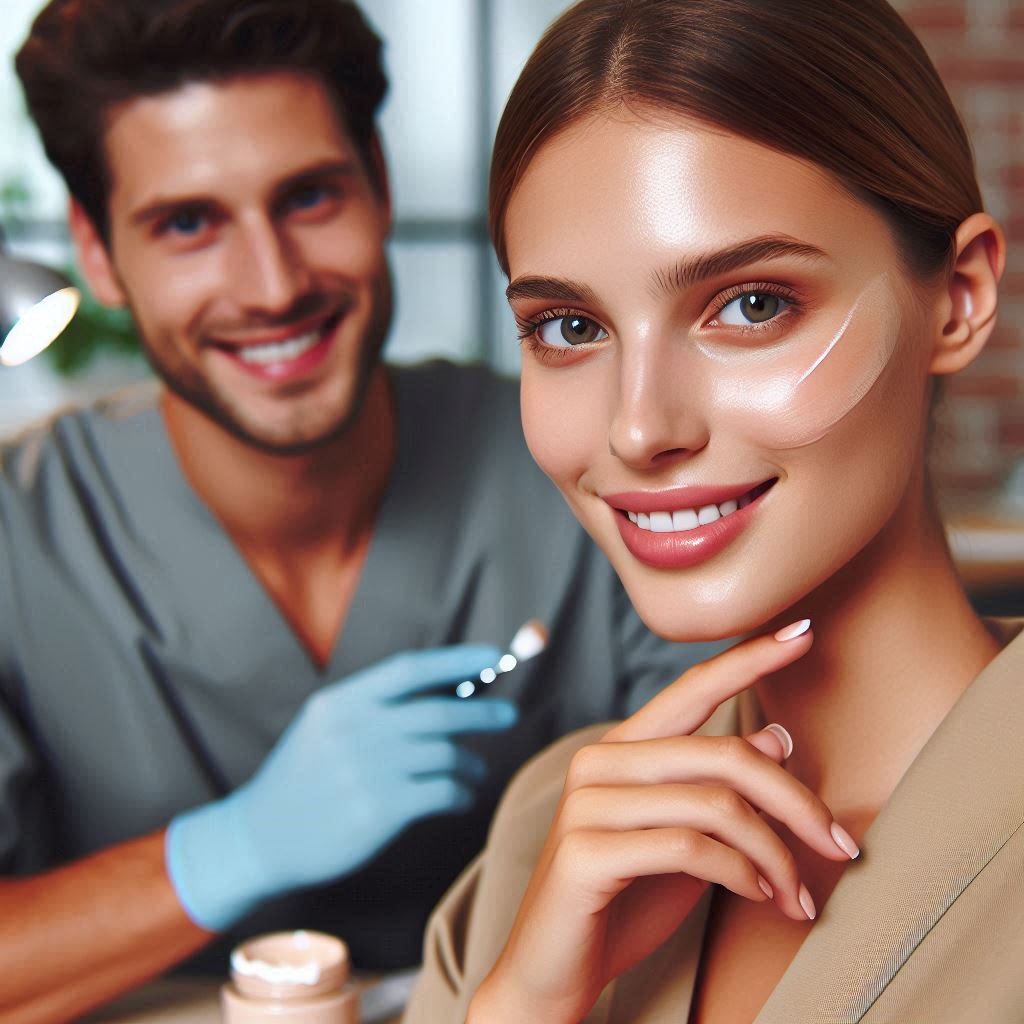Introduction
Estheticians play a crucial role in enhancing skin health and beauty.
They provide various services, including facials, skin treatments, and makeup application.
Estheticians also educate clients about proper skin care and recommend products tailored to individual needs.
Their expertise helps clients achieve and maintain healthy, glowing skin.
Becoming a licensed esthetician is essential for several reasons.
First, licensing ensures that estheticians meet specific education and training standards.
This training covers anatomy, skin types, product knowledge, and safety practices.
A solid foundation in these areas enables estheticians to provide effective and safe treatments.
Second, being licensed instills trust in clients.
Clients feel more comfortable knowing their esthetician has met the required standards.
They can expect professional services that prioritize their well-being.
This trust fosters long-lasting relationships between estheticians and clients.
Additionally, licensing opens up various career opportunities.
Licensed estheticians can work in salons, spas, and medical offices.
They may also choose to specialize in specific areas, such as skincare, makeup artistry, or spa management.
This versatility allows estheticians to build fulfilling careers.
Furthermore, licensed estheticians stay updated on industry trends and advancements.
They engage in continuing education to enhance their skills and knowledge.
This commitment to learning keeps them competitive in a rapidly evolving field.
In fact, estheticians provide vital services that promote skin health and confidence.
Transform Your Career Today
Unlock a personalized career strategy that drives real results. Get tailored advice and a roadmap designed just for you.
Start NowLicensing is critical to establishing credibility and professionalism in the industry.
Aspiring estheticians should prioritize obtaining their licenses to unlock their potential and thrive in their careers.
Requirements to Become a Licensed Esthetician
Becoming a licensed esthetician involves specific requirements that ensure you possess the necessary knowledge and skills.
Here are the key components:
Education Requirements
To start, aspiring estheticians must complete a high school diploma or GED.
This foundational education provides essential skills in communication and critical thinking.
Afterward, enrolling in an accredited esthetician program is crucial.
These programs typically last from six months to a year.
Students learn about skin care, makeup application, and hair removal techniques.
Additionally, they study anatomy, physiology, and sanitation practices.
Completing coursework equips students with the theoretical knowledge needed for their future careers.
Training and Certification Process
After finishing an esthetician program, candidates must undergo hands-on training.
Many programs include clinical hours, allowing students to practice skills under supervision.
This practical experience is invaluable for building confidence and competence.
Once training is complete, candidates often seek certification.
Certification from a reputable organization enhances your credentials and demonstrates professionalism.
Some employers prefer certified estheticians, making this step advantageous in a competitive job market.
State Licensing Requirements
The final step to becoming a licensed esthetician involves meeting state licensing requirements.
Each state has specific regulations, so it‘s vital to research local requirements.
Most states require passing a written and practical exam.
Transform Your Career Today
Unlock a personalized career strategy that drives real results. Get tailored advice and a roadmap designed just for you.
Start NowThe exams assess knowledge of skin care procedures and safety protocols.
Once you pass, you can apply for your esthetician license.
Additionally, some states require continuing education to maintain your license.
Staying updated with industry trends and practices is essential for career longevity.
In short, becoming a licensed esthetician requires a high school diploma, specialized education, hands-on training, certification, and state licensing.
Following these steps will prepare you for a successful career in esthetics, allowing you to provide quality services to clients and thrive in the beauty industry.
Read: Understanding the Economics of Running a Barber Shop
Steps to take to become a licensed Esthetician
When considering a career as a licensed esthetician, there are specific steps that must be taken to achieve this goal.
Let’s dive into the details of what it takes to become a licensed esthetician.
Enroll in an Accredited Esthetician Program
The first step in becoming a licensed esthetician is to enroll in an accredited esthetician program.
Look for a program that is recognized by the state board of cosmetology and meets the requirements for licensure.
During your time in the esthetician program, you will learn about skin care techniques, facial treatments, hair removal, makeup application, and more.
It is essential to gain a solid foundation in esthetics to prepare you for your career as a professional esthetician.
Complete Required Training Hours
One of the requirements for becoming a licensed esthetician is completing a certain number of training hours.
The number of hours required varies by state, so it is essential to check with your state board of cosmetology for specific requirements.
These training hours will allow you to gain hands-on experience in performing various esthetician services under the supervision of a licensed instructor.
You will have the opportunity to practice your skills and techniques to ensure you are fully prepared for the licensing exam.
Pass the State Licensing Exam
After completing your esthetician program and training hours, the next step is to pass the state licensing exam.
This exam tests your knowledge and skills in esthetics to ensure you are ready to practice as a licensed esthetician.
Be sure to study and review all of the materials covered in your esthetician program to prepare for the licensing exam.
Transform Your Career Today
Unlock a personalized career strategy that drives real results. Get tailored advice and a roadmap designed just for you.
Start NowOnce you pass the exam, you will officially become a licensed esthetician and can begin your career in the field of esthetics.
By following these steps and meeting the requirements set forth by your state board of cosmetology, you can become a licensed esthetician and pursue a rewarding career helping others look and feel their best.
Read: Essential Grooming Products for Barbers

Skills and Qualities Needed to Succeed
As you embark on the journey to become a licensed esthetician, it’s essential to possess certain skills and qualities that will help you succeed in this field.
Here are some key attributes that will set you apart as a top-notch esthetician.
Attention to detail
Having a keen attention to detail is crucial in the world of esthetics.
As an esthetician, you will be performing delicate procedures that require precision and accuracy.
Whether you are giving a facial, waxing, or performing other skincare treatments, it’s essential to pay close attention to every detail to ensure your clients receive the best possible service.
Good communication skills
Communication is a vital skill in any profession, but it’s especially important in esthetics.
As an esthetician, you will be working closely with clients to understand their needs, preferences, and concerns.
Being able to communicate effectively with clients will not only help you build rapport but also ensure that you are able to deliver the results they desire.
Additionally, good communication skills will help you explain the procedures, products, and aftercare advice to your clients clearly and concisely.
Ability to work well with clients
Estheticians interact with a wide range of clients on a daily basis, each with their unique personalities, preferences, and expectations.
To succeed in this field, it’s crucial to have the ability to establish rapport with clients, make them feel comfortable, and build trust with them.
Developing strong interpersonal skills will help you create a positive and welcoming environment for your clients, leading to repeat business and referrals.
In essence, possessing attention to detail, good communication skills, and the ability to work well with clients are essential qualities that will help you thrive as a licensed esthetician.
By honing these skills and qualities, you will not only excel in your esthetics career but also build a loyal client base who trust you to help them achieve their skincare goals.
Read: Cruise Ship Dining: Behind the Scenes with the Staff
Career opportunities for licensed Estheticians
After becoming a licensed esthetician, there are various career opportunities that you can explore in the beauty industry.
Spa and Salon Employment
Many licensed estheticians find rewarding careers working in spas and salons.
Transform Your Career Today
Unlock a personalized career strategy that drives real results. Get tailored advice and a roadmap designed just for you.
Start NowThey specialize in providing skincare treatments, facials, and other beauty services.
Medical Esthetician Positions
Some estheticians choose to work in medical settings, such as dermatology offices or plastic surgery clinics.
They provide advanced skincare treatments and work closely with healthcare professionals.
Entrepreneurial Opportunities
As a licensed esthetician, you have the option to start your own business.
This can include opening your own spa, offering mobile services, or creating your own skincare product line.
Overall, becoming a licensed esthetician opens up a world of possibilities in the beauty industry.
Whether you choose to work in a traditional spa setting, pursue a medical esthetician position, or start your own business, there are plenty of opportunities for growth and success.
Read: Career Growth Opportunities for Professional Barbers
Continuing Education and Specializations
Continuing education is vital for licensed estheticians.
It helps you stay competitive in the beauty industry and enhances your skill set.
Advanced Training and Certifications
Consider pursuing advanced training and certifications.
These programs offer specialized knowledge in areas like chemical peels, microdermabrasion, or laser treatments.
Obtaining additional certifications boosts your credibility and marketability.
Many clients seek estheticians with advanced qualifications.
Participating in workshops and seminars also sharpens your techniques.
These experiences connect you with industry experts, expanding your professional network.
Specializing in Specific Treatments
Focusing on specific treatments can differentiate you from other estheticians.
Choose a specialty that aligns with your interests and the needs of your clientele.
Options include facials, body treatments, or makeup application.
Each specialty requires tailored training to master unique techniques.
Transform Your Career Today
Unlock a personalized career strategy that drives real results. Get tailored advice and a roadmap designed just for you.
Start NowSpecializing allows you to attract a niche audience seeking expertise in that area.
Clients often prefer specialists for their in-depth knowledge and skill.
Building a reputation in a specific treatment enhances your career prospects.
Keeping Up with Industry Trends and Techniques
Staying updated on industry trends and techniques is essential.
The beauty industry evolves rapidly, introducing new products and methods.
Follow beauty blogs, attend trade shows, and engage with social media influencers.
These resources provide insights into emerging trends and popular techniques.
Participating in continuing education courses helps you stay informed.
Regularly updating your skills ensures you offer the latest services to clients.
This commitment to growth enhances your professional reputation.
In summary, pursuing continuing education and specializations is crucial for estheticians.
Advanced training enhances skills, specializing attracts clients, and staying updated keeps you relevant.
Invest in your education and career for long-term success.
Job outlook and salary for Estheticians
When considering a career as a licensed esthetician, it‘s essential to weigh the job outlook and average salary range to make an informed decision.
Here‘s a comprehensive overview of what you can expect in terms of growth opportunities and earning potential in this field:
Growth in the Industry
The esthetics industry is experiencing steady growth, with an increasing demand for skincare services and treatments.
As people become more aware of the importance of self-care and overall well-being, the need for professional estheticians continues to rise.
Moreover, advancements in technology and skincare products have led to a surge in specialized treatments such as microdermabrasion, chemical peels, and laser therapy.
Estheticians who stay updated on the latest trends and techniques will have a competitive edge in the market.
Average Salary Range for Licensed Estheticians
On average, licensed estheticians can expect to earn a salary range of $30,000 to $50,000 annually.
Transform Your Career Today
Unlock a personalized career strategy that drives real results. Get tailored advice and a roadmap designed just for you.
Start NowFactors such as location, years of experience, employer, and additional certifications can impact the salary level.
Entry-level estheticians may start at the lower end of the salary range, while those with advanced skills and expertise can command higher pay rates.
Specializing in niche areas such as medical esthetics or holistic skincare can also result in increased earning potential.
Factors That May Affect Salary Potential
- Location: Estheticians working in metropolitan areas or upscale spas may earn higher salaries compared to those in rural areas or small salons.
- Experience: Years of experience in the field can significantly impact an esthetician‘s earning potential.
Seasoned professionals with a loyal client base often charge premium rates for their services. - Employer: Estheticians employed by luxury resorts, high-end salons, or renowned skincare clinics typically receive competitive compensation packages, including bonuses and benefits.
- Certifications: Holding additional certifications in specialized areas such as microblading, LED light therapy, or lymphatic drainage can increase an esthetician‘s market value and earning capacity.
- Client Base: Building a strong client base through exceptional service, positive reviews, and referrals can lead to increased demand for an esthetician‘s services and higher income potential.
Essentially, the job outlook for licensed estheticians is promising, with ample opportunities for professional growth and financial success.
By staying current on industry trends, honing your skills, and providing exceptional service to clients, you can position yourself for a rewarding and lucrative career in the field of esthetics.
See Related Content: Event Planner Career: Steps to Start Your Own Business
Conclusion
After understanding the necessary steps, becoming a licensed esthetician is achievable through dedication and passion.
By completing a state-approved esthetician program, passing the licensing exam, and fulfilling any additional requirements, you can begin your career.
Don’t hesitate to pursue a career in esthetics if you have a love for skincare, beauty, and helping others feel confident.
Continuous education and professional development in the field of esthetics are crucial to staying current with trends and techniques.
By attending workshops, seminars, and advanced training courses, you can enhance your skills and expand your knowledge as an esthetician.
Remember that the beauty industry is constantly evolving, and investing in ongoing education will set you apart as a knowledgeable professional.




